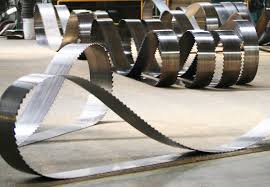Tech News
The Future of Medium and Heavy-Duty Trucks: Innovations Driving the Industry
Key Takeaways
- Medium and heavy-duty trucks are evolving rapidly with new technologies.
- Electric and fuel-efficient engines are becoming more prevalent.
- Automation and intelligent technologies are improving safety and efficiency.
- Regulatory changes are influencing design and function.
Table of Contents
- Electric Trucks: The Future is Now
- Smart Technology: Enhancing Safety and Efficiency
- Fuel Efficiency: Reducing Costs and Emissions
- Autonomous Vehicles: What to Expect
- The Impact of Regulations on Truck Design
- Conclusion
Electric Trucks: The Future is Now
The trucking sector plays a fundamental role in our economy by delivering goods nationwide, ensuring businesses operate smoothly and satisfying consumers. However, it is also a sector experiencing significant changes due to innovative technologies transforming various aspects such as transportation and company procedures. Transportation and logistics are some industries that could be more advanced in technology and have been faster in adopting the most recent innovations. Nevertheless, implementing modern technologies offers the potential to modernize this crucial industry. The trucking industry is experiencing a significant transformation, and one of the most exciting developments is the shift towards electric vehicles (EVs). While EVs were once mainly confined to passenger cars, electric powertrains now substantially impact medium and heavy-duty trucks. This evolution is driven by various factors, including renewable energy incentives and semi-truck auctions that offer more eco-friendly options. With a growing consumer demand for greener transportation solutions, significant manufacturers are heavily investing in electric truck technology.
Electric trucks offer numerous benefits, including reduced fuel costs, lower emissions, and quieter operation. Companies spearhead this revolution with innovative electric truck models, poised to transform the industry. Due to advancements in battery technology, electric trucks’ range and performance are continually getting better, making them a feasible choice for long-distance transportation. The shift to electric trucks also aligns with global goals to reduce carbon footprints and combat climate change, marking a crucial step towards a more sustainable future.
Smart Technology: Enhancing Safety and Efficiency
Smart technology is pivotal in modernizing medium—and heavy-duty trucks. Technology like ADAS, real-time diagnostics, and fleet management software are crucial in improving safety and efficiency in the trucking industry. These advancements reduce the chances of accidents, simplify transportation operations, and reduce interruptions by supplying up-to-date information on vehicle functionality and maintenance requirements.
Automated driving systems are also making significant strides. These systems help drivers by taking care of tasks, decreasing the need for human involvement. Automated driving systems strive to enhance road safety as they reduce the chance of human error. As reported by Trucking Info, creating these technologies is a crucial move toward advancing self-driving vehicles, which will improve safety and productivity. As these technologies advance, they are expected to become regular components in the trucking sector, transforming the transportation of goods.
Fuel Efficiency: Reducing Costs and Emissions
Fuel efficiency remains a top priority in the evolving trucking industry. Advances in engine technology and adopting alternative fuels are crucial in reducing fuel costs and emissions. Engines running on CNG and LNG are gaining popularity as they provide a cleaner and more efficient option than traditional diesel engines. These alternative fuels reduce operational costs and contribute significantly to lowering greenhouse gas emissions.
Hybrid systems that combine electric and diesel power are also gaining traction. These systems combine the advantages of a diesel engine in terms of range and control with an electric motor’s efficiency and environmental benefits. By reducing fuel consumption and emissions, hybrid systems are paving the way for a more sustainable future in the trucking industry. Companies continuously explore new technologies. These innovations are essential for meeting stringent environmental regulations and achieving long-term cost savings.
Autonomous Vehicles: What to Expect
The development of autonomous vehicle technology is another groundbreaking frontier in the trucking industry. Autonomous trucks could transform the transportation industry by boosting effectiveness, reducing driver exhaustion, and decreasing the chances of accidents. Companies are in charge of this technology, conducting extensive testing and development to bring autonomous trucks to market.
While the widespread adoption of autonomous trucks may still be years away, the progress is promising. Fleets of autonomous trucks could significantly reduce shipping times and costs while enhancing road safety. However, various regulatory hurdles and technological challenges must still be overcome before self-driving trucks become commonplace. Issues such as cybersecurity, legal liability, and the need for advanced infrastructure are critical areas that must be addressed. Despite these obstacles, the possible advantages of self-driving trucks present them as a hopeful option for the future of transportation.
The Impact of Regulations on Truck Design
Regulatory changes are continuously shaping the future of medium—and heavy-duty trucks. Stricter emission standards, safety regulations, and fuel efficiency requirements are driving innovation in truck design. To adhere to these regulations, manufacturers must create more environmentally friendly engines, advanced safety systems, and efficient design practices. These regulatory demands ensure that trucks contribute to global environmental goals and prioritize road safety.
The introduction of new technologies, such as electric powertrains and autonomous driving systems, is also influenced by regulatory changes. Governments worldwide are enacting measures to promote more environmentally friendly and safer transportation options, speeding up innovation in the trucking sector. Regulations often catalyze technological advancements, pushing manufacturers to explore new possibilities and improve existing systems. The synergy between regulations and technological innovation is crucial for achieving a sustainable and efficient future in trucking.
Conclusion
The trucking sector is on the edge of a significant change, propelled by technological advancements and changing regulatory demands. Electric powertrains, intelligent technologies, fuel-efficient systems, and autonomous vehicles are all set to play a crucial role in the future of medium and heavy-duty trucks. As the industry continues to evolve, these innovations promise a greener, safer, and more efficient future for trucking, offering numerous benefits for both companies and the environment. Adopting these changes and remaining ahead of the game will be crucial for individuals involved in the trucking sector to succeed in this modern age of transportation.
Related Posts












